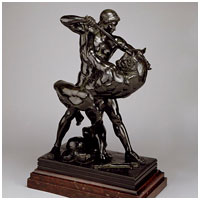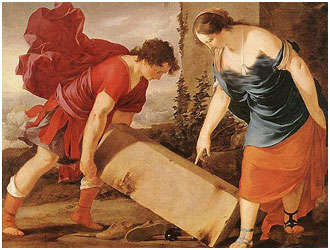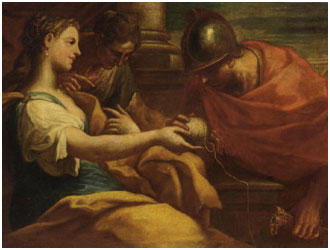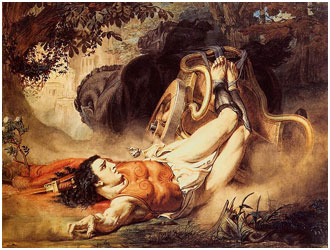Theseus, the Minotaur slayer
 Theseus was a famous Greek hero, also known as a king of Athens and a slayer of Minotaur. He was also a great friend of Heracles who was his idol because of his extreme strength. Heracles influenced Theseus to go on his own dangerous quests. However, unlike Heracles, Theseus had other individual attributes like divine wisdom and intelligence. He was able to read others and outsmart them if necessary. His leadership was appreciated and respected by people, because he always endeavored for the common good. His early adventures benefited the city and its region. He is credited as the founder of Athens's democracy, voluntarily turning many of his powers as a king over to an elected assembly, and, very quickly, gained a reputation for helping the poor and oppressed. Theseus had an adventurous life, traveling a lot and overcoming many obstacles. He also had a family, once he settled in Athens and finished one of his last quests which was to join his idol Heracles in a quest to bring back Hippolyta's girdle. However, the gods influenced some of the events inside his family which resulted in his son's death. Because of the grief and sorrow, he fell into, his life ended tragically.
Theseus was a famous Greek hero, also known as a king of Athens and a slayer of Minotaur. He was also a great friend of Heracles who was his idol because of his extreme strength. Heracles influenced Theseus to go on his own dangerous quests. However, unlike Heracles, Theseus had other individual attributes like divine wisdom and intelligence. He was able to read others and outsmart them if necessary. His leadership was appreciated and respected by people, because he always endeavored for the common good. His early adventures benefited the city and its region. He is credited as the founder of Athens's democracy, voluntarily turning many of his powers as a king over to an elected assembly, and, very quickly, gained a reputation for helping the poor and oppressed. Theseus had an adventurous life, traveling a lot and overcoming many obstacles. He also had a family, once he settled in Athens and finished one of his last quests which was to join his idol Heracles in a quest to bring back Hippolyta's girdle. However, the gods influenced some of the events inside his family which resulted in his son's death. Because of the grief and sorrow, he fell into, his life ended tragically.
Theseus is usually depicted, as a healthy grown man, holding a sword and fighting the minotaur. On several occasions, he is also depicted in the company of his mother Aethra and in the company of Ariadne.
Birth of Theseus and his enthusiasm
Theseus was a son of Aethra, a daughter of king Pittheus of Troezen. Pittheus was a great friend of Aegeus, an ancient king of Athens, who had no heir despite being married twice. After seeing the oracle of Delphi and not being given a clear answer, the kings came to an agreement. Pittheus secretly gave away his daughter to Aegeus, while he was visiting Troezen. After Aethra and Aegeus had slept together on the wedding night she couldn't fall asleep and took a walk in a moonlight, way through the coast of Poros. There she was seduced by Poseidon and had been impregnated with both the god and the king in a single night. The next day, king Aegeus decided that he didn't need a wife, only an heir. He was planning for his departure but before he buried his sword and sandals under the rock in front of Aethra. He told her to send Theseus to Athens, once he would grow enough to be able to move the rock and retrieve the lineage of his father. Once Theseus reached early manhood, he set for Athens. He was advised to take a safer sea route instead of dangerous roads, but the young enthusiast had already made his decision to confront everyone and everything that would come on his path. Theseus was fired up to emulate the great Greek hero Heracles who happened to be his idol and a source of inspiration.
On way to Athens
Before he departed, his mother Aethra showed him where his father had hidden a sword and sandals. After recovering the lineage of his father, he was on his way and it was not long before Theseus encountered his first adventure. From the distance, he recognised a bandit called Periphetes from his grandfather's stories. The bandit was said to be a son of Hephaestus, an Olympian god of craftsmanship. He was known for his cruelty, dashing the heads of bypassing travellers with his iron club. Theseus bravely confronted him and after a fierce battle, in a retribution to serve justice, smashed the head of the bandit with his own iron club. He kept the weapon as his trophy and soon reached Ishmir of Corinth. The locals warned him of facing Siris, another bandit, who was guarding a passage from Corinth to Athens. Siris was said to tie his victims between two trees and use the trees to serve him as a catapult, victims being the ammunition, and then hurl them way in the air so they would crash upon landing, which gave the bandit great pleasure. This story, however, did not put fear in Theseus' head and prevented him to kill the bandit with his own method. Upon killing Siris, he also raped his daughter Perigune who happened to be at wrong place at the wrong time. Later on, he overcame another challenge north of the Isthmus. At a place called Crommyon, he killed the Crommyonian Sow, a pig of enormous size that was bred by an old woman named Phaea. Next bandit, that Theseus had met, was in the narrow cliff trail near the borders of Megara. Evil Scyron urged bypassing travellers to wash his feet with their back to the sea so that he could kick them into the deep waters below, where a sea monster was preying on victims. However, when Theseus came along it was the bandit who was eaten by the sea monster. Theseus then came across Eleusis where king Cercyon challenged him to a wrestling match like he had been doing it in the past, challenging travellers, beating them and then killing them in a disguise of sacrificial ceremony. But the hero instead won, killed the king and brought down this archaic religious ritual by refusing to be sacrificed. The last encounter before Athens was in the plains of Eleusis where he encountered Procrustes, a giant, who had an imaginative way of showing his hospitality to travelers. He had two beds, one large and one small and would offer small one to tall people and the other way around. To the tall people he would cut off limbs to make a perfect fit for the small bed and he would stretch short people to make them fit for the large bed. Theseus treated the giant in the same way, removing his legs and decapitating his head off.
He was known for his cruelty, dashing the heads of bypassing travellers with his iron club. Theseus bravely confronted him and after a fierce battle, in a retribution to serve justice, smashed the head of the bandit with his own iron club. He kept the weapon as his trophy and soon reached Ishmir of Corinth. The locals warned him of facing Siris, another bandit, who was guarding a passage from Corinth to Athens. Siris was said to tie his victims between two trees and use the trees to serve him as a catapult, victims being the ammunition, and then hurl them way in the air so they would crash upon landing, which gave the bandit great pleasure. This story, however, did not put fear in Theseus' head and prevented him to kill the bandit with his own method. Upon killing Siris, he also raped his daughter Perigune who happened to be at wrong place at the wrong time. Later on, he overcame another challenge north of the Isthmus. At a place called Crommyon, he killed the Crommyonian Sow, a pig of enormous size that was bred by an old woman named Phaea. Next bandit, that Theseus had met, was in the narrow cliff trail near the borders of Megara. Evil Scyron urged bypassing travellers to wash his feet with their back to the sea so that he could kick them into the deep waters below, where a sea monster was preying on victims. However, when Theseus came along it was the bandit who was eaten by the sea monster. Theseus then came across Eleusis where king Cercyon challenged him to a wrestling match like he had been doing it in the past, challenging travellers, beating them and then killing them in a disguise of sacrificial ceremony. But the hero instead won, killed the king and brought down this archaic religious ritual by refusing to be sacrificed. The last encounter before Athens was in the plains of Eleusis where he encountered Procrustes, a giant, who had an imaginative way of showing his hospitality to travelers. He had two beds, one large and one small and would offer small one to tall people and the other way around. To the tall people he would cut off limbs to make a perfect fit for the small bed and he would stretch short people to make them fit for the large bed. Theseus treated the giant in the same way, removing his legs and decapitating his head off.
Meeting Aegeus and his evil wife
When Theseus finally arrived to Athens, he decided not reveal his true identity right away. Aegeus offered him accommodation but was curious and suspicious of the newcomer. But the king's wife and queen Medea, who was also an evil sorceress, recognised him immediately and feared that Theseus would be chosen as an heir to the kingdom of Athens. Medea had previously fled to Athens from Corinth, after taking revenge on Jason, by killing their own three sons. She soon arranged a task which would see Theseus get killed. She sent him on a task to capture the Marathonian bull. On the way to Marathon, Theseus was offered a shelter from a storm in the lodge of an old woman called Hecale. She swore she would sacrifice the bull to Zeus, if he was successful in capturing it. Theseus managed to capture the animal but, when he returned to the lodge, Hecale was already dead. In her honor, Theseus named one of the regions in Attica after her. When Theseus brought the bull before the king and sacrificed him in front of everyone, the evil sorceress wanted to poison him, offering him a cup of wine. But Aegeus, a king of Athens, finally recognised the sandals and the sword and in a heat of moment, when trying to embrace his son, he knocked off the poisonous cup. With much joy and celebration, Aegeus named Theseus his son and a successor to his throne. Medea was said to had fled to Aisa upon losing her chance of getting the heritage of Athens.
Slaying the Minotaur
Becoming a rightful heir to the kingship of Athens, however, did not stop Theseus from having adventures. Soon the time had come for Theseus to learn and face that Athens will have to send seven most courageous men and seven beautiful maidens to Crete to be sacrificed to the Minotaur, a half man and a half bull monster. The reason behind this was the murder of Androgens, the younger son of the Cretan king, by the Athenians. King Aegeus would be facing incoming war with Cretans, if he declined to deliver the assassins of Androgens. However, the king, not knowing who the assassins were, had surrendered Athens to Cretans. The Cretan king Minos then demanded for seven youth warriors and seven maidens to be sacrificed and sent to Crete every seventh year. Theseus volunteered for going to Crete, despite his father's objections. He assembled the rest of youths and promised his father that they will be sailing with white flags instead of black ones, if they are successful in slaying the beast. Before they set sail, Theseus visited the oracle of Delphi who instructed him to make Aphrodite his patroness, if he wants to come out victorious. Theseus obeyed and made a sacrificial ceremony to Aphrodite, just before the departure. When they came to Crete, Aphrodite immediately repaid the hero by casting a spell on Ariadne, a daughter of king Minos, who fell in love with Theseus. She then gave him a sharp sword to slay the minotaur and, on the advise of Daedalus, she also gave him a ball of thread with which he would be able to find a way back from the treacherous labyrinth. Theseus had promised to Ariadne that, if he came back alive from the labyrinth, he would take her with him back to Athens. When Theseus and his companions entered the labyrinth, the hero bound a string of the ball to the door post and grabbed his sword that he kept hidden inside his tunic. Theseus followed the instructions of Ariadne, given by Daedalus, to go forward, always down and never left or right. After a while, he came to the heart of the labyrinth and upon the sleeping Minotaur. The beast felt presence and awoke to confront the hero. Tremendous fight then occurred, in which Theseus overpowered the Minotaur with his cleverness and strength and stabbed the beast in the throat with his sword. After decapitating the beast, they use the thread to find a way out of the labyrinth and returned to the shore where Ariadne, and a ship, was waiting to set course, before Minos could find out that they had killed his beast and escaped. They stopped in Naxos to rest. While sleeping, Theseus had a dream in which Dionysus approached him and told him to let Ariadne go because Fates had other plans for her. The god of wine might have done that out of his personal desire because later on she got married with Dionysus and they had many children. Anyhow, when Theseus in the morning set sail with the youths of Athens, he left Ariadne behind. It is said that when she woke up and found out that she had been left behind, she cursed Theseus and the crew and therefore they forgot to change their flag upon arrival as agreed before departure. When they finally approached Athens, Aegeus was standing on the cliff where he used to come and wait for Theseus. The king saw the black flag and thought his son was dead. In agony, he committed suicide by jumping from the cliff into the waters below and drowned. The Athenians named the Aegean sea after their king and the name is still there to this day.
Theseus obeyed and made a sacrificial ceremony to Aphrodite, just before the departure. When they came to Crete, Aphrodite immediately repaid the hero by casting a spell on Ariadne, a daughter of king Minos, who fell in love with Theseus. She then gave him a sharp sword to slay the minotaur and, on the advise of Daedalus, she also gave him a ball of thread with which he would be able to find a way back from the treacherous labyrinth. Theseus had promised to Ariadne that, if he came back alive from the labyrinth, he would take her with him back to Athens. When Theseus and his companions entered the labyrinth, the hero bound a string of the ball to the door post and grabbed his sword that he kept hidden inside his tunic. Theseus followed the instructions of Ariadne, given by Daedalus, to go forward, always down and never left or right. After a while, he came to the heart of the labyrinth and upon the sleeping Minotaur. The beast felt presence and awoke to confront the hero. Tremendous fight then occurred, in which Theseus overpowered the Minotaur with his cleverness and strength and stabbed the beast in the throat with his sword. After decapitating the beast, they use the thread to find a way out of the labyrinth and returned to the shore where Ariadne, and a ship, was waiting to set course, before Minos could find out that they had killed his beast and escaped. They stopped in Naxos to rest. While sleeping, Theseus had a dream in which Dionysus approached him and told him to let Ariadne go because Fates had other plans for her. The god of wine might have done that out of his personal desire because later on she got married with Dionysus and they had many children. Anyhow, when Theseus in the morning set sail with the youths of Athens, he left Ariadne behind. It is said that when she woke up and found out that she had been left behind, she cursed Theseus and the crew and therefore they forgot to change their flag upon arrival as agreed before departure. When they finally approached Athens, Aegeus was standing on the cliff where he used to come and wait for Theseus. The king saw the black flag and thought his son was dead. In agony, he committed suicide by jumping from the cliff into the waters below and drowned. The Athenians named the Aegean sea after their king and the name is still there to this day.
Becoming King of Athens
As the only eligible heir, Theseus soon became a king of Athens. He won the endorsement and admiration of the citizens of Athens who saw in him as a wise and far-sighted ruler, as well as a fearless and brave warrior. Theseus unified the diverse Attic communities into one powerful centrally-administered state. Commerce and agriculture flourished and Athens became an important maritime port, as Theseus rightfully believed that the sea would give power to Athens. He also established the Isthmian Games to commemorate the tasks which he had performed during his journey from Troezen to Athens and inaugurated many new festivals, including the Panathenaic festivals, dedicated to goddess Athena, the protector of the city.
Having a new family
Theseus then, after a while, joined Heracles on the quest to bring back Hippolyta's girdle. The amazons were about to give it over peacefully, when Hera sparked the fight where many amazons got killed and the queen Hippolyta got kidnapped by Theseus who claimed her for his bride. She eventually bore him a son and gave him name Hippolytus. However, Theseus fell in love with another woman, called Phaedra, and soon married her. The issues began when Hippolytus was in his early twenties and decided to favour and show all his devotion to Artemis instead of Aphrodite. The goddess of love got angry and made Theseus' wife Phaedra to deeply fell in love with her step son Hippolytus. When he scornfully rejected the advances of his mother-in-law, Phaedra committed suicide from her despair. But, before she died, she wrote a letter stating that Hippolytus raped her and that this was the reason behind her action. Enraged, Theseus turned to his father Poseidon in a prayer, asking the god to punish Hippolytus. Poseidon answered and sent a monster that frightened the horses drawing the chariot of Hippolytus. The horses went mad, overturning the chariot and dragging along the youth who had been trapped in the reins. Meanwhile, Artemis told Theseus the truth about what happened and the king rushed after his boy and found him badly injured. It was too late as the poor Hippolytus expired in the arms of his father.
However, Theseus fell in love with another woman, called Phaedra, and soon married her. The issues began when Hippolytus was in his early twenties and decided to favour and show all his devotion to Artemis instead of Aphrodite. The goddess of love got angry and made Theseus' wife Phaedra to deeply fell in love with her step son Hippolytus. When he scornfully rejected the advances of his mother-in-law, Phaedra committed suicide from her despair. But, before she died, she wrote a letter stating that Hippolytus raped her and that this was the reason behind her action. Enraged, Theseus turned to his father Poseidon in a prayer, asking the god to punish Hippolytus. Poseidon answered and sent a monster that frightened the horses drawing the chariot of Hippolytus. The horses went mad, overturning the chariot and dragging along the youth who had been trapped in the reins. Meanwhile, Artemis told Theseus the truth about what happened and the king rushed after his boy and found him badly injured. It was too late as the poor Hippolytus expired in the arms of his father.
Tragic end of Theseus
Theseus fell in a deep grief because of this incident and started losing control and reliability which led to the decline of popularity among the citizens of Athens. His former heroic acts and deeds were blurring away and soon rebellions began to surface, all around, against his rule. Theseus gave away his right to the throne and fled to the island of Skyros where king Lycomedes allegedly threw him off the cliffs into the sea, because he was afraid of Theseus' attempt to overthrow him. And this was the tragic end of one of the most famous Greek heroes that died upon landing into the sea.